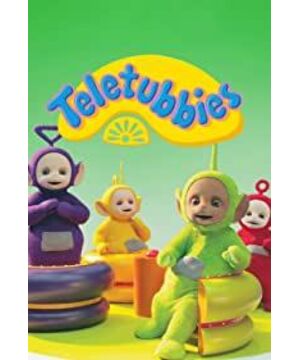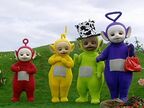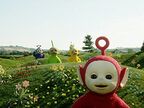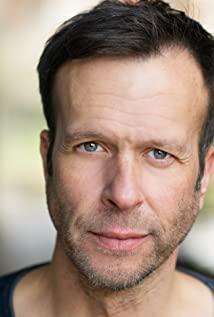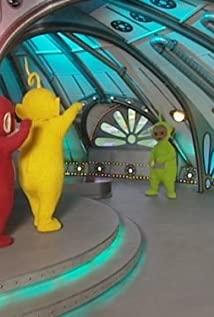I don't know why I found Teletubbies by swiping Douyin, and I was surprised to find that all 4 Teletubbies have babies!
There are 8 Antenna Little Treasures, all of them are little babies who are not very good at speaking. Through their pronunciation, they are named Mimi, Da Da, Xiaobing, Baa Baa, Ru Ru, Ning, Ding Di, and Yubi.
Unexpectedly, after 30 years old, you can still watch Teletubbies with relish. In addition to being cute, I am full of emotion. Even my childhood friends, Teletubbies, have cubs, and each of them is a second child. It is very happy, and my little friends and I are still single.
On second thought, how did I get this video? Wouldn't it be precisely targeted to unmarried, unmarried, single young people of the right age?
As a senior curiosity, I collected some introductions to Teletubbies-
Teletubbies is a children's programme produced by the BBC and Ragdoll. In 1996, Ragdoll signed a contract with the BBC and began producing the 260-episode, 30-minute children's show. The first edition was released from 1997 to 2001, and the main audience was preschool children from 12 months old to 5 years old. At present, Teletubbies has been introduced into 113 countries and regions, and has been translated into 45 languages for broadcast.
"Teletubbies is set with two elements: one is a "fantasy field" and the other is a "real record".
"Fantasy Garden" refers to the main scene of "Teletubbies". There are many fantasy wonders on the island, which allow children to be creative and imaginative; four Teletubbies play on the magical island and have a good relationship with each other, no violence, Although I don't know a lot of things, I love to learn.
Teletubbies are products of science and technology, imaginary characters, not equivalent to humans, so they do not necessarily have human relationships such as parents, siblings, etc., and they will make a "beep" sound when they sit down. "
Therefore, it seems that the Teletubbies are not necessarily the cubs of the Teletubbies, but just another technological product produced. But why is our first thought that they have an ethical relationship between parent and child?
Recently, the two-child and three-child policy has been introduced frequently, and the unmarried young people around me have felt a strong "love" that has been bred by the state. A friend of mine who works in a state-owned enterprise in Shanghai said:
"Since my salary has been lowered, I have to pay my mortgage every month. The pressure of life is huge, and my mood has become very bad. There are various nodules and polyps in the physical examination. My parents are afraid of stimulating me, so they have stopped urging marriage. I can take a breath, but I didn't expect that the Internet has inherited the will of my parents and persistently passed on the anxiety of being unmarried."
Not to mention that young people in big cities do not want to get married due to the pressure of life, and even young people in rural areas are less willing to have children.
The Qingdao Municipal Bureau of Statistics released a survey report on the marital relationship of rural youth in Qingdao, showing that rural youth in the city are not very willing to have two or three children. Among the married survey respondents, 58.43% had one child, 29.78% had two children, and 11.8% had no children. Survey respondents are not very willing to have a second child; they have not responded positively to the newly introduced three-child policy.
The rural social security system is improving day by day, the concept accepted by everyone has been updated, the motivation of "raising children to prevent old age" has gradually been weakened, the cost of raising children is too high, and the idea of contemporary rural young people's pursuit of personal quality of life has led to their lack of willingness to bear children.
I know a lot of DINK families, and there are also families with two children. I have summed up the following three characteristics of happy families:
1. First of all, they are not forced to choose marriage. Whether it is free love or blind date, these couples get married voluntarily, not because of pressures such as age and parental urging, and there is no half-assistance and helplessness.
2. Whether it is a DINK or a second child, the decision is not impulsive . It is after communication between the husband and wife, and the decision is made together. No one has to take more responsibility for the decision.
3. Don't compare what you don't have with what others have. DINK will not envy the liveliness of a multi-child family, and a second-child family will not be jealous of DINK's freedom. They choose their own path, they will only focus on their own direction, and they will adjust slightly, but they will not be easily replaced. .
4. When making these decisions, there are not too many entanglements , it is relatively smooth, and there are not too many difficulties and resistances to overcome. (I think this is because they all know themselves better. Whether it is economic strength, personal characteristics, or abilities, they can clearly know the boundary, so the decisions they make are more in line with the actual level, and naturally there is not much resistance. )
Whether or not to marry, when to marry, and who to marry, no matter how you choose, there is no standard or right or wrong. The key is how to take the road after making the choice.
Everyone should look at problems from the perspective of dialectical development. What is suitable for others may not be suitable for oneself. There is no need to envy what others have. Look at what you have.
The best people are not trying to get what they don't have, but how to make the most of what they have.
Life requires doing what you can.
View more about Teletubbies reviews


